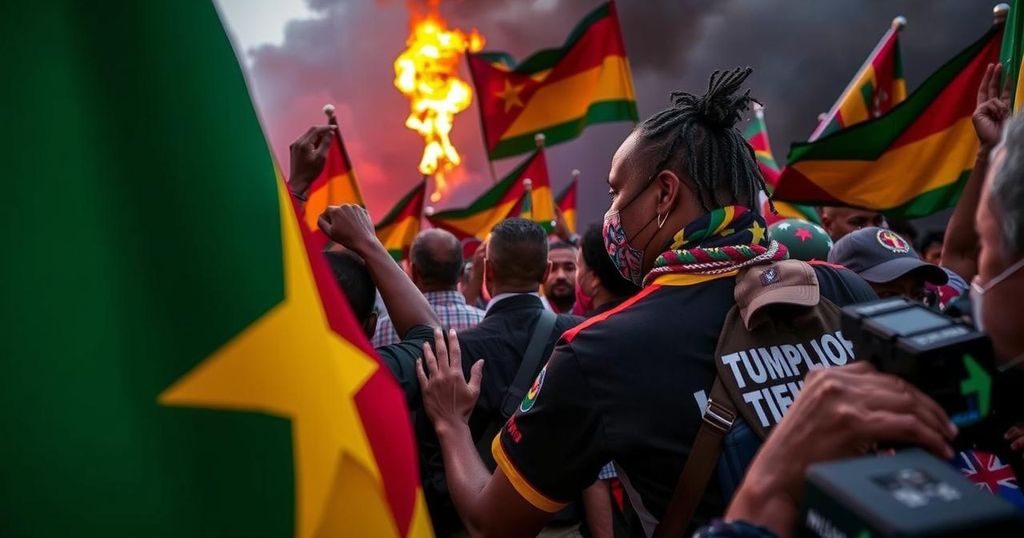Protests Erupt in Mozambique Following Controversial Election Results

Protests across Mozambique erupted following the recent elections that resulted in the ruling Frelimo party’s president candidate securing 70.7% of the votes amid widespread allegations of rigging. The protests led to the deaths of at least 11 individuals, including Silvio Jeremias. As public outrage grows, calls for political change and accountability continue to resonate among the grieving citizens.
On the night of October 25, Silvio Jeremias was returning home from work in Maputo, Mozambique, when he encountered a protest against the results of the recent elections. Official results indicated that Daniel Chapo, the candidate from the ruling Frelimo party, had garnered 70.7% of the votes. Despite this, allegations of electoral fraud have emerged, suggesting extensive rigging by the party that has remained in power since Mozambique’s independence in 1975. Tragically, during the protest, Jeremias was shot and killed by police, becoming one of at least eleven individuals who lost their lives during demonstrations across the nation on October 24 and 25; another fifty were reported to have sustained serious gunshot injuries, according to Human Rights Watch. Authorities claimed that live ammunition was only deployed into the air to disperse crowds. Police spokesperson Angela Uaela reported that at least one woman was killed and five others injured by bullets that were described as “stray,” resulting from attempts to disarm a supporter of the opposition party, Podemos. As one of the most impoverished nations globally, Mozambique’s youth—whose average age is under 18—are increasingly disenchanted with Frelimo’s prolonged governance. Boasting a compelling vision, Podemos’s candidate Venâncio Mondlane—a former banker and forestry engineer—was able to resonate with the younger electorate. According to Podemos, they secured 53% of the vote and 138 parliamentary seats, thereby initiating a formal legal challenge backed by voluminous documentation. In contrast, the official election commission announced an increase in Frelimo’s parliamentary seats to 195, while Podemos received only 31. Preceding the electoral process, civil society groups accused Frelimo of registering close to 900,000 fictitious voters within an electorate of 17 million. Allegations of ballot stuffing surfaced from Mozambique’s Catholic bishops, and European Union observers noted counting irregularities and unwarranted alterations in the results. On October 19, two individuals—a lawyer and a filmmaker linked to Podemos—were murdered by unidentified assailants, an act that commentators suggest fits a dangerous trend of violence against opposition figures in Mozambique, with no accountability for the perpetrators. Amidst this crisis, António Niquice, a member of Frelimo’s central committee, expressed his shock concerning the killings and urged judicial accountability. Additionally, there have been reports of plainclothes officers shooting at Mondlane during a press conference held at the scene of the murders of Dias and Guambe. Mourners for Jeremias have turned their grief into a demand for justice and political reform, with processions calling for democracy and accountability. In poignant demonstrations, attendees wore T-shirts emblazoned with Jeremias’s image while voicing their demands. Caught in the throes of their loss, the community’s call resonates deeply as they cry out: “You can kill me but don’t kill democracy.”
This article deals with the aftermath of the recent elections in Mozambique, highlighting the turmoil faced following the announcement of the results. The ruling Frelimo party won the elections amidst widespread accusations of electoral fraud. This level of discontent has led to public unrest, resulting in tragic loss of life as security forces clashed with protestors. The societal backdrop of Mozambique’s high poverty levels and young population growing increasingly disaffected with Frelimo provides context for the political climate in Mozambique. Key figures involved in the protests and electoral processes, particularly those representing the opposition, have faced violent repercussions. The article draws attention to systemic issues regarding governance and accountability within the country.
The recent protests in Mozambique, following controversial election results, have tragically resulted in multiple fatalities and injuries, starkly underscoring the growing disenchantment with the ruling Frelimo party. The discontent among the youth, accusations of electoral fraud, and significant acts of violence directed at opposition figures illustrate an urgent need for political reform and justice. The resounding cries for democracy from a grieving populace highlight the tensions present in Mozambique’s ongoing struggle for fair governance.
Original Source: www.theguardian.com








